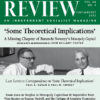Trampling Out the Sanctimony
This big book is great U.S. history. A solid, comprehensive, richly detailed, brilliantly composed study of a major post-1960 movement in U.S. labor, it is also a dramatic narrative vivid with critical analysis of the movement’s developing strengths and faults, and thick with lessons for the struggles of today’s left. | more…
A Wisconsin Enigma
It is curious as well as enormously exciting to be surrounded by a mass movement, full of enthusiasm, energy, and eagerness to adopt labor slogans and labor songs, almost as if the 1930s and ’40s had come back. And it is all the more curious because the emergence of the movement seemed so spontaneous and unexpected, taking every Marxist (and any other) would-be savant by surprise, your reviewer most definitely included. Eighteen months and a major electoral defeat later, the “Wisconsin Uprising” goes on, with dampened spirits but a continuation of innovative extras. One small example is the “Overpass Light Brigade,” a group of urban guerillas who hold LED-lit slogans in various spots of the state, ridiculing Governor Scott Walker and his lackeys, until the cops arrive. But where is it going? | more…
Medicine and Empire
For the past three decades Howard Waitzkin has been (along with Vicente Navarro) the leading social medicine theorist in the United States. Medicine and Public Health at the End of Empire provides a superb sampling of Waitzkin’s wide-ranging work, and a readily accessible introduction to the searching insights offered by a Marxist view of medicine. | more…

July-August 2012 (Volume 64, Number 3)
As the economies of Europe, North America, and Japan continue to stagnate orthodox economics has revealed itself to be bankrupt, unable to explain what is happening much less what to do about it. It was not the failure to see the “Crisis of 2008” coming that represents the economics profession’s biggest failure, Paul Krugman declared in a recent talk, but what came after: “the profession’s descent into uninformed quarreling,” coupled with its reversion to Say’s Law (the notion that supply creates its own demand)—the disproof of which was the main achievement of the Keynesian revolution.… Yet… [no] prominent orthodox analyst, has sought to engage in a genuine overhaul of received economics on the level of what Keynes accomplished in the 1930s. Indeed, no such scientific revolution appears possible within mainstream economics today, which is characterized not by its realism but its irrealism—serving now an entirely ideological function. Here one is reminded of Paul Sweezy’s observation nearly fifty years ago: “Bourgeois economics, I fear, has irrevocably committed itself to what Marx called ‘the bad conscience and evil intent of apologetic.’ If I am right, Keynes may turn out to be its last great representative” | more…
Introduction to Special Issue on the Critique of Economics
Fifty years ago this month two chapters, “The Giant Corporation” and “On the Quality of Monopoly Capitalist Society—I,” of Paul Baran and Paul Sweezy’s then forthcoming book, Monopoly Capital, were published in a special issue of Monthly Review. Among the other chapters in rough draft form by the end of 1962 were “Some Implications for Economic Theory” (later to be re-entitled “Some Theoretical Implications”) and “On the Quality of Monopoly Capitalist Society—II.” However, Baran’s death in March 1964, before the book was finished, left some unresolved questions with regard to these chapters. Consequently, Sweezy decided to leave these two chapters out of the book when it was finally published in 1966.… This special issue of Monthly Review is organized around the publication of one of these missing chapters of Monopoly Capital: “Some Theoretical Implications.” | more…
A Missing Chapter of Monopoly Capital
Monopoly Capital: An Essay on the American Economic and Social Order by Paul A. Baran and Paul M. Sweezy, published in 1966, is one of the foundational works in the development of Marxian political economy in the United States and indeed the world, and is today recognized as a classic, having generated more than four-and-a-half decades of research and debate. The completion of the book, however, was deeply affected by Baran’s death, on March 26, 1964, two years before the final manuscript was prepared. Although all of the chapters were drafted in at least rough form and had been discussed a number of times the authors had not mutually worked out to their complete satisfaction certain crucial problems. Consequently, two chapters were left out of the final work.… What happened to these two missing chapters—”Some Implications for Economic Theory” and presumably “On the Quality of Monopoly Capitalist Society—II”—remained for many years a mystery. | more…
Some Theoretical Implications
That all is not well in the realm of bourgeois economic theory is strongly felt by its closest observers. Professor Mason’s blunt statement that “the functioning of the corporate system has not to date been adequately explained,” could hardly be contradicted by anyone familiar with contemporary economic literature. Its most conspicuous feature is, indeed, this very failure to come to grips with the most important aspects of what, one would think, should constitute its central problem.… The reasons for this striking reluctance to place the realities of modern capitalism where they belong: at the center of theoretical attention, are not far to seek… There can be no doubt that the model of a perfectly competitive market economy is “more tractable,” that the examination of its manifold properties is more readily achievable by means of conventional tools of economic analysis than that of a system dominated by oligopolistic corporations. It may not be economics’ claim to applause, but it is understandable that most of its practitioners prefer not to tackle “intractable” matters, but to move along the line of the least theoretic resistance. | more…
Last Letters
These “Last Letters” were written by Baran and Sweezy in late February and early March 1964 and concerned “Some Theoretical Implications,” a chapter that Baran had drafted in 1962 and that they were then revising for their book Monopoly Capital. The discussion was cut short by Baran’s death around two weeks later.… They are published here for the first time. | more…
The Surplus in Monopoly Capitalism and the Imperialist Rent
Paul Baran and Paul Sweezy dared, and were able, to continue the work begun by Marx. Starting from the observation that capitalism’s inherent tendency was to allow increases in the value of labor power (wages) only at a rate lower than the rate of increase in the productivity of social labor, they deduced that the disequilibrium resulting from this distortion would lead to stagnation absent systematic organization of ways to absorb the excess profits stemming from that tendency.… This observation was the starting point for the definition that they gave to the new concept of ’surplus.”… I have always considered this bold stroke as a crucial contribution to the creative utilization of Marx’s thought.… but [Baran and Sweezy] refused to stop, like so many other Marxists, at the exegesis of his writings.… Having, for my part, completely accepted this crucial contribution from Baran and Sweezy, I would like, in this modest offering for the special issue that Monthly Review is devoting to honoring their work, to put forward a ’quantitative metric” of that surplus. | more…
The GDP Illusion
The ’GDP Illusion” is a fault in perception caused by defects in the construction and interpretation of standard economic data. Its main symptom is a systematic underestimation of the real contribution of low-wage workers in the global South to global wealth, and a corresponding exaggerated measure of the domestic product of the United States and other imperialist countries. These defects and distorted perceptions spring from the neoclassical concepts of price, value, and value added which inform how GDP, trade, and productivity statistics are devised and comprehended. The result is that supposedly objective and untarnished raw data on GDP, productivity, and trade are anything but; and standard interpretations conceal at least as much as they reveal about the sources of value and profit in the global economy. | more…
Keynes, Steindl, and the Critique of Austerity Economics
Austerity is now ’in fashion,” as governments respond to the revenue shortfalls of the crisis through deficit reduction plans and fiscal stability pacts, and economists blame it on the profligate spending of households and countries. Consumers, they say, bought houses they could not afford and countries consumed more than they produced, while loose monetary policies made this spending possible. Governments ’got prices wrong,” keeping interest rates too low for too long, and while increases in government spending might alleviate current employment problems, this deficit spending is inflationary, and in any case will not help in the long run as budget deficits raise interest rates, ’crowding out” business and household spending. It is as if we have stepped back in time, to the depression years of the 1930s, when monetary theories of the cycle were dominant, the ’overinvestment” of the boom blamed for the downturn, and effective fiscal actions proposed by Keynes and others blocked by preoccupation with the public debt and its burdens.… The analysis here is concerned with the systematic rejection of Keynes’s and Kalecki’s revolution in economics and the resurrection of Say’s Law (supply creates its own demand) of pre-Keynesian economics in all but name—a view that underlies today’s austerity economics. | more…
Two Pauls
In 1957, when I was young and thought I knew everything, I was just about to go to graduate school in economics. Then I read Paul Baran’s The Political Economy of Growth. I immediately sent him an eight-page, single-spaced review of his book. I said that I liked it very much, but had some questions about it. Paul wrote back asking me to become his research assistant and study at Stanford. Unfortunately he could pay so little that it covered only half the tuition. I could not afford it.… [But] I did visit Paul about once every two weeks. He welcomed me because his colleagues had isolated him due to their fears of the witch hunt. The reason he had offered me so little was that Stanford would not give him more money for any purpose. Paul had tenure, but the alumni were angry that he was not fired for his outspoken opposition to U.S. imperialist aggression against Cuba. | more…

June 2012 (Volume 64, Number 2)
By any measure, Adrienne Rich lived an exemplary life. When she died last March 27, aged eighty-two, she was acknowledged by many critics as perhaps this country’s foremost poet.… Throughout her writing life, Adrienne Rich’s vision of a better world was clear. In her 2008 collection A Human Eye: Essays on Art in Society Rich claimed Che Guevara, Karl Marx, and Rosa Luxemburg as defining heroes. It did not matter if she was speaking to a room full of undergraduates or, having made the long painful climb up the hill to the Women’s Correctional Facility in Bedford Hills, New York, to teach poetry to its inmates, Adrienne’s voice was trenchant. So it was not surprising that when the commercial media ran obituaries of her, they sanitized her life and work, giving more emphasis to her awards than her work, characterizing her as angry rather than radical. At MR however, we preferred to hear her words: “Responsibility to yourself means refusing to let others do your thinking, talking, and naming for you; it means learning to respect and use your own brains and instincts; hence, grappling with hard work” (from “Claiming an Education,” 1977). | more…